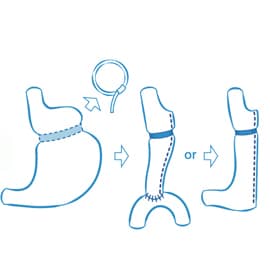Single-stage revisional bariatric surgery is a procedure that combines the removal of a gastric band with the conversion to either a gastric sleeve or gastric bypass surgery in the same operation. This surgery is typically performed for patients who have experienced either complications from their gastric band surgery, or who have not lost enough weight or had their health conditions resolved after gastric band surgery.
Why might someone need single-stage revisional bariatric surgery?
There are a number of reasons why someone might need single-stage revisional bariatric surgery, including:
Not enough weight loss after gastric band surgery: Gastric band surgery is not as effective for weight loss as gastric sleeve or gastric bypass surgery. If a patient has not lost enough weight after gastric band surgery, they may consider single-stage revisional surgery to achieve their weight loss goals.
Weight regain after gastric band surgery: Gastric band surgery is not as effective for preventing weight regain as gastric sleeve or gastric bypass surgery. If a patient has regained weight after gastric band surgery, they may consider single-stage revisional surgery to lose the weight again and reduce their risk of long-term health complications.
Health complications caused by the gastric band: Gastric bands can lead to a number of health complications, such as reflux and vomiting, band slippage or erosion. If a patient is experiencing serious health complications from their gastric band, they may consider single-stage revisional surgery to remove the band and reduce their risk of further complications.
Medical conditions associated with their obesity were not resolved after having gastric band surgery: Gastric band surgery can help to improve or resolve many health conditions related to obesity, such as type 2 diabetes, high blood pressure, and high cholesterol. However, some patients may find that their health conditions do not improve or resolve after gastric band surgery. If this is the case, they may consider single-stage revisional surgery to improve or resolve their health conditions.
What are the risks of single-stage revisional bariatric surgery?
Like any surgery, single-stage revisional bariatric surgery carries some risks. However, the overall risk of complications is relatively low. Some of the potential risks of single-stage revisional bariatric surgery include:
What are the advantages of single-stage revisional bariatric surgery?
You have one operation rather than two, reducing recovery and time off work
You will not be at risk of weight gain that occurs in two staged revisional surgery
Quality of eating improves with removal of the gastric band
Further weight loss and improvement in medical conditions
What is the recovery process like after single-stage revisional bariatric surgery?
As for gastric sleeve and gastric bypass surgery the recovery is the same with a hospital stay of 2-3 days after single-stage revisional bariatric surgery.
After surgery, you will need to follow a strict diet to allow your stomach pouch and intestines to heal. You will start with a liquid diet and gradually move up to a solid diet over several weeks. You will also need to take vitamins and supplements to prevent nutritional deficiencies.
What is the long-term outlook after single-stage revisional bariatric surgery?
Single-stage revisional bariatric surgery is very effective weight loss surgery. It has the main advantage of completing the surgery in one operation rather than two. Complication rates are no higher compared with 2-staged surgery.
Most people who have single-stage revisional bariatric surgery are able to lose significant weight and keep it off in the long term. However, it is important to follow a healthy diet and exercise regularly after surgery to maintain your weight loss.
Additional information for non-medical readers
Single-stage revisional bariatric surgery is complex surgery, but it is performed laparoscopically (using keyholes). This means that you will have smaller incisions and a shorter recovery time.
After single-stage revisional bariatric surgery, you will need to follow a lifetime nutrition plan and take vitamin supplements to prevent nutritional deficiencies.
It is important to note that single-stage revisional bariatric surgery is not a quick fix for weight loss. It is a major surgery, and it takes time and effort to recover and adjust to your new lifestyle.
If you are considering single-stage revisional bariatric surgery, talk to your doctor to learn more about the risks and benefits of this procedure. They can help you to decide if single-stage revisional bariatric surgery is the right option for you.
